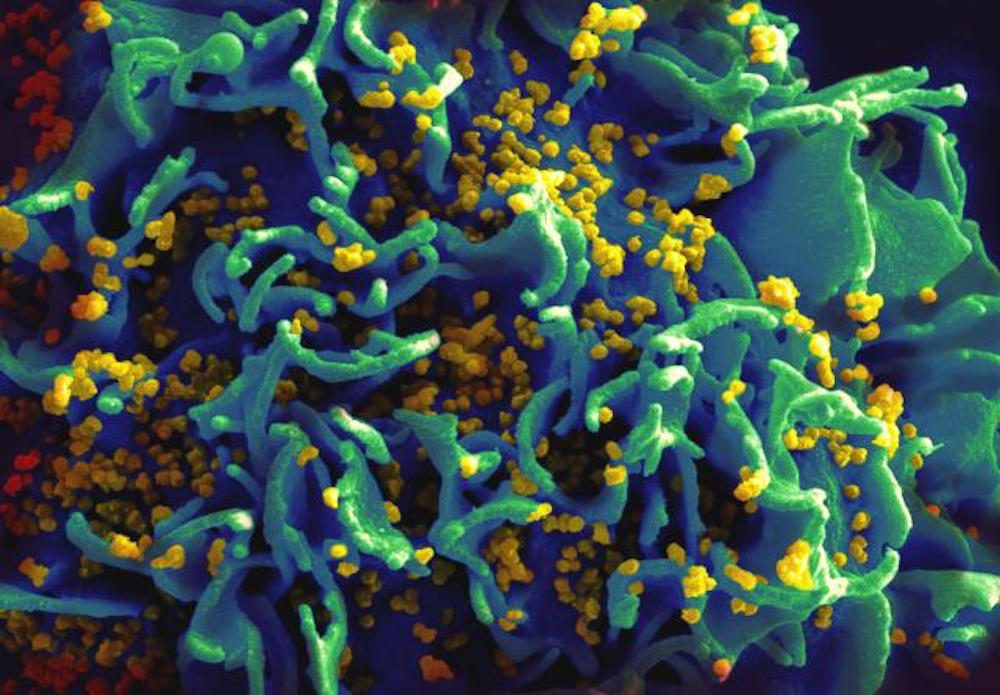Advertisement
Study: HIV Prevention Could Need Cocktail Of Antibodies

It takes a cocktail of drugs to treat HIV. It could take a cocktail of antibodies to prevent HIV as well, suggests a study by Boston-based researchers published this week in Science Translational Medicine.
I spoke to researcher Dr. Dan Barouch, professor of medicine at Beth Israel Deaconess Medical Center and Harvard Medical School (who recently published work on a 'mosaic' HIV vaccine as well.) Here’s our conversation, lightly edited.
Can you sum up your study?
What we saw is that a cocktail of antibodies is required to protect monkeys against a mixed virus challenge, whereas single antibodies were unable to protect. This data suggests that a mixture of antibodies will likely be more effective than single antibodies for HIV prevention and therapy.
What is the challenge when developing an HIV vaccine or treatment?
One of the unique features about HIV that is a big challenge for both vaccine and therapeutic development is virus variability. There is a huge number of different genetic variants of the virus and there isn't any single antibody that covers all viruses. So, to get complete protection, we will almost certainly need multiple antibodies targeting different regions of the virus and protein.
How is this treatment different from the ‘mosaic’ vaccine?
So a vaccine works very differently. A vaccine is part of the actual virus that induces the body to generate its own antibody responses. Here, what we have are monoclonal antibodies that are single sequences of some of the most potent antibodies that have ever been identified. They're made at high levels and then it's administered essentially like a drug to an animal or to a human, either before or after infection.
A simple way of thinking about it is that a vaccine involves administration of a substance that induces the body to make its own antibodies, whereas what we were doing in this paper is we were using antibodies produced in the laboratory.
In this study, monkeys that were infected with HIV showed a 100 percent success rate. Will this success rate translate to humans?
That's a very good question. We don't know for sure, but what we do think to be the case is that a cocktail of antibodies will do better than any single antibodies would, because of the problem of HIV virus variability.
Can you tell me more about how the treatment worked in monkeys?
Sure. What we showed is that single antibodies gave no protection at all against the challenge with a mixture of viruses. However, a cocktail of two antibodies gave 100 percent protection. So it was really a black and white difference. We think the reason is the two antibodies can neutralize all the viruses in the virus mixture, whereas each single antibody could not.
So, a person infected with HIV has more than one virus?
A person infected with HIV would have a vast diversity of different virus sequences, even within the same individual. And so both for therapy of that individual, as well as for prevention of infection in a different individual, it is likely that a cocktail of antibodies that cover a much broader range of viruses than any single antibody will prove optimal.
What’s next?
We've shown in this animal model the proof of concept that an antibody cocktail does better than a single antibody against this mixed virus challenge. And right now, we've just started a phase 1 clinical trial to test the combination of these two antibodies in humans.
This is a phase 1 study and the objective will only be to obtain safety and antiviral activity. But the current phase 1 study is too small to ask the question as to whether this cocktail would actually protect.
How long until this cocktail could reach the clinic?
It's very hard to put a timeline. The good news is that these two antibodies have already been produced at a clinical grade, and we're doing first human clinical studies now. The results of those early phase clinical trials will dictate the subsequent development pathway. So we really can't say now when the large clinical trials -– if and when -– they will be done.
Anything to add?
Well, I think these data provide the proof of concept that multiple antibodies are going to be needed for this approach. It's very similar to triple-drug therapy, that if we administer a single antiretroviral drug, then the virus can rapidly develop resistance, whereas a cocktail of drugs is needed for prolonged viral suppression. It is likely that will be a very similar pattern, where a single antibody will have some efficacy, but only partial. The cocktail of antibodies will likely prove much more efficacious.